“Firstly, the phrase ‘the meaning of a word’ is a spurious phrase. Secondly and consequently, a re-examination is needed of phrases like the two which I discuss, ‘being a part of the meaning of’ and ‘having the same meaning’. On these matters, dogmatists require prodding: although history indeed suggests that it may sometimes be better to let sleeping dogmatists lie.”
John L. Austin
Dictionaries often have different definitions– particularly for some “political” terminology like “socialism” and “capitalism.” It is useless to debate varying dictionary definitions, but the words below will help you see the context of some of the ideas and words on this website so you have an idea what I mean while using these words. How others use them may vary.
A Tentative Definitions List
►Artificial Scarcity– a scarcity created by intervention, be they the State or other, rather than a natural scarcity or scarcity based on a intervention-free market of exchange. It is the “limiting of production of goods and services which would otherwise be plentiful and inexpensive” (to create a monopoly often brought about with patents and copyright). source | also see: artificial scarcities and artificial abundance
►Artificial Property Right– a right that creates artificial scarcity (and/or monopolies). It is a property right based on decree by law or the State, rather than the natural right of property based on Lockean principles of natural law. They “enable the privileged to appropriate productivity gains for themselves, rather than allowing their benefits to be socialized through market competition…Privileged sellers [with artificial property rights] can charge consumers in proportion to their increased utility, despite the decreased cost of supplying the good.” source | also see Thomas Hodgskin
“Property” is defined below under “Property”
►Capitalism– Capitalism is the power and privilege to institute the ism, which is ultimately usury-based, and not just usury in the form of interest, but also includes usury a la rent and profit (at least rent where rental income overtakes the procurement value). Capitalism is not a system of free exchange or competition, but an instance of control to manipulate them to extract rent, interest, or profit. Profit and interest are both rents. Capitalism is unequal or unfair exchange that typically depends on political power to forge and enforce legislation and regulation to raise the price above the base cost. It is cost plus, i.e. exploitation. At one time this appropriation was achieved via aristocratic privilege, now it is vested in States engaged in land theft, subsidies, charters, licensing, patents and other legal monopolies and protections. Capitalism is “capitulatism,” where escaping a price above cost is nearly impossible. Capitalism is privilege or gratuitous appropriation, i.e. usury, with artificial “ownership Rights to control access to natural opportunities.” Capitalism can happen between two or more people or systemically ‘where the State intervenes in the economy on behalf of capitalists to create artificial scarcities, artificial property rights, erect entry barriers, enforce monopolies, and cartels so capitalists can collect rents…because free competition is prevented from driving the price of things to their true cost of production.’ Kevin Carson
…both “capitalism” and “socialism” have multiple meanings throughout history and across the nuances of the spectrum of political ideology, and that “anarchism” could be said to (1) have an ambiguous relationship with both of them and (2) be distinguished from and opposed to both of them, depending on the particular meaning used. At a minimum, it is more accurate to separate them both into authoritarian and libertarian senses, hence why some anarchists (myself included) have come to use the dual-terminology of “state-socialism vs. social anarchism” and “state-capitalism vs. free markets”. As far as the history of anarchism goes, the distinction between anarchism and state-socialism was made most clear by Benjamin Tucker’s writing “State Socialism and Anarchism: How Far They Agree and Wherein They Differ.”
Brainpolice
In short, capitalism is “market order, business-government partnership, and rule by capitalists” Advocates of Freed Markets Should Embrace “Anti-Capitalism”
Libertarians sometimes debate whether the “real” or “authentic” meaning of a term like “capitalism” is (a) the free market, or (b) government favoritism toward business, or (c) the separation between labor and ownership, an arrangement neutral between the other two; Austrians tend to use the term in the first sense; individualist anarchists in the Tuckerite tradition tend to use it in the second or third. But in ordinary usage, I fear, it actually stands for an amalgamation of incompatible meanings.
Suppose I were to invent a new word, “zaxlebax,” and define it as “a metallic sphere, like the Washington Monument.” That’s the definition — “a metallic sphere, like the Washington Monument. ” In short, I build my ill-chosen example into the definition. Now some linguistic subgroup might start using the term “zaxlebax” as though it just meant “metallic sphere,” or as though it just meant “something of the same kind as the Washington Monument.” And that’s fine. But my definition incorporates both, and thus conceals the false assumption that the Washington Monument is a metallic sphere; any attempt to use the term “zaxlebax,” meaning what I mean by it, involves the user in this false assumption. That’s what Rand means by a package-deal term.
Now I think the word “capitalism,” if used with the meaning most people give it, is a package-deal term. By “capitalism” most people mean neither the free market simpliciter nor the prevailing neomercantilist system simpliciter. Rather, what most people mean by “capitalism” is this free-market system that currently prevails in the western world. In short, the term “capitalism” as generally used conceals an assumption that the prevailing system is a free market. And since the prevailing system is in fact one of government favoritism toward business, the ordinary use of the term carries with it the assumption that the free market is government favoritism toward business.
And similar considerations apply to the term “socialism.” Most people don’t mean by “socialism” anything so precise as state ownership of the means of production; instead they really mean something more like “the opposite of capitalism.” Then if “capitalism” is a package-deal term, so is “socialism” — it conveys opposition to the free market, and opposition to neomercantilism, as though these were one and the same.
And that, I suggest, is the function of these terms: to blur the distinction between the free market and neomercantilism. Such confusion prevails because it works to the advantage of the statist establishment: those who want to defend the free market can more easily be seduced into defending neomercantilism, and those who want to combat neomercantilism can more easily be seduced into combating the free market. Either way, the state remains secure. from:Roderick Long‘s Rothbard Memorial Lecture.
“Rothbard’s ‘Left and Right’: Forty Years Later“
more from Long to clear it up, or not, here, as shown below in his “control of the mop” chart:
- socialism-1 control of the means of production by society (whether organized via the state or not)- SOOTMOP
- capitalism-1 control of the means of production by private individuals (albeit perhaps contractually associated)- POOTMOP
- socialism-2 control of the means of production by the workers themselves- WOOTMOP
- capitalism-2 control of the means of production by someone other than the workers – i.e., by capitalist owners- OOOTMOP, “O” meaning “outside”
- Long’s table above is essentially a poorer version of David Ellerman’s “Institutional” table posted below under “institutions.”
Types of Capitalism and Socialism from Long, Chartier, and Johnson (more details below under institutions):
- Capitalism 1: property rights and voluntary exchange. free enterprise? LTP; PCOTMOP private control of the means of production (by private individuals, perhaps contractually associated)
- Capitalism 2: pro-business government interference in markets MPT; CCOTMOP capitalist control of the means of production (by someone other than the workers, i.e. capitalist or societial owners)
- Capitalism 3: rule/bossism of workplaces, society, and (if there is one) the state by capitalists. wage labor? (a small number of people control investable wealth and the means of production)
- Capitalism 4: profit dominated society, a reflection or outcome of 2 and/or 3
- Socialism 1: LTV; SCOTMOP state or societal control of the means of production (by society, whether organized by the state or not); is LTV socialism or capitalism 2 +/- 3?
- Socialism 2: LTP; WCOTMOP worker control of the means of production (by the workers themselves); anarcho-communism is more simpatico to LTV
- Types of capitalists @ wiki
- Capitalism vs. capitalism
- Capitalism: the known reality
- Distinguished-capitalists
- Hans-Hermann Hoppe‘s view of capitalism
- “Under Capitalism”?
►Institutions– can be classified as alienist or inalienist based on Alienation versus Delegation, not Coercion-versus-consent framing. This is the crux of the libertarian question, and where the problems lay with government, and minarchism as well. David Ellerman laid it out nicely here.
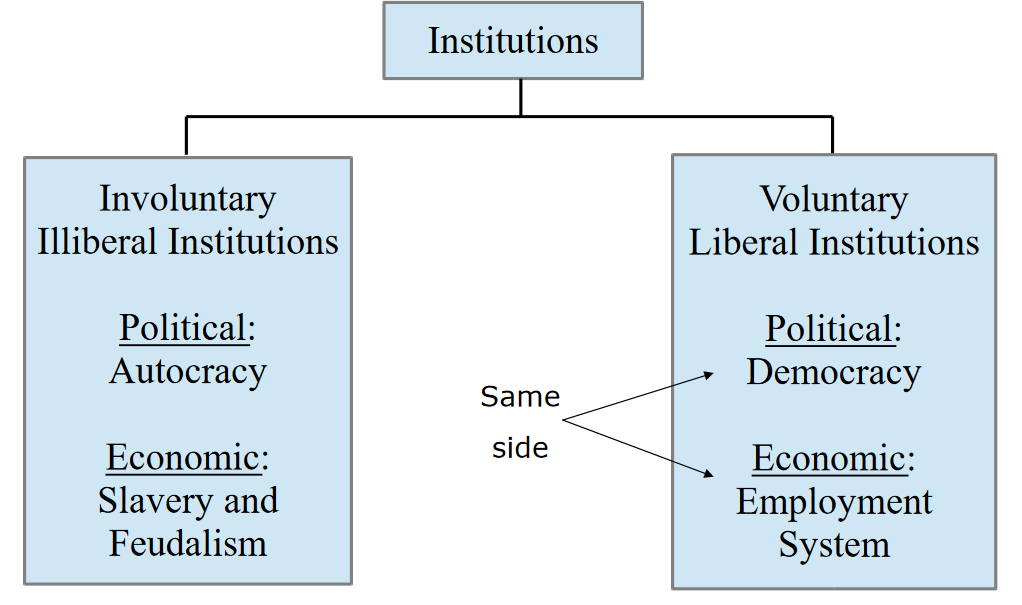
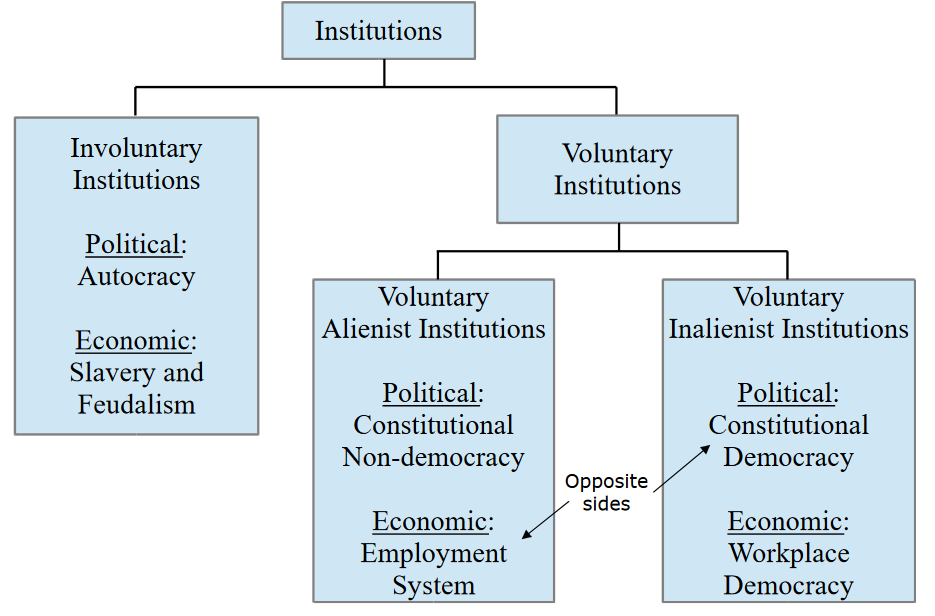
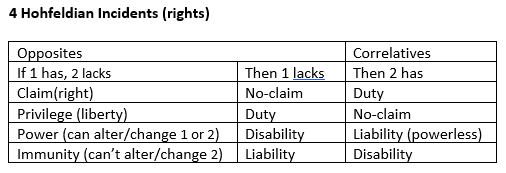
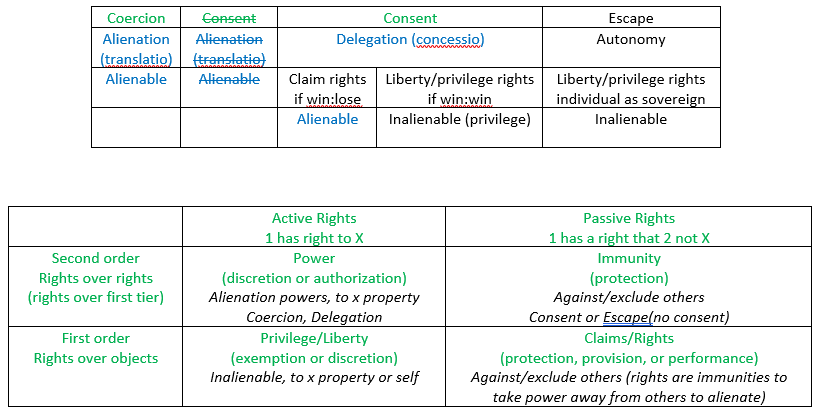
Expanded and re-framed again:
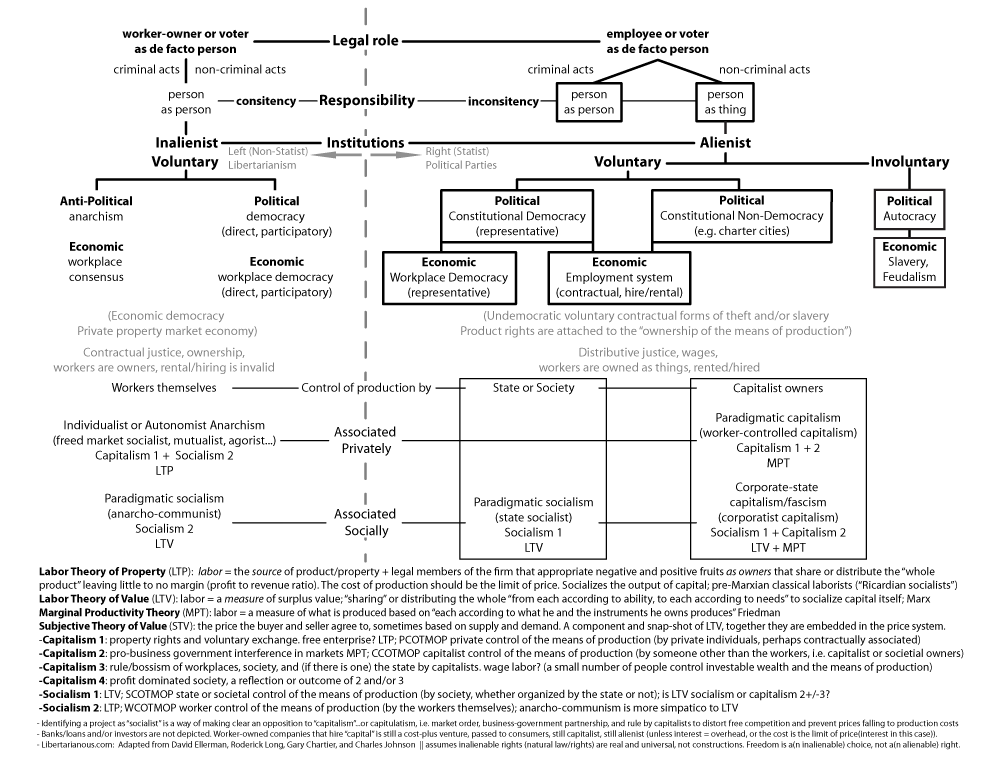
►Interest– paying an amount more than the amount borrowed. Usually justified as payment to the loaner for risk. However, if the loan is paid back in full (and on time) the interest should be returned because the risk (or trust) was falsely assessed, and the loan payments are cost plus or ultimately theft. Would you ask your mother, father, or relatives for interest? Which homo sapiens are not a relative, albeit distant? Capitalism, i.e. interest, grows money supplies, and births inflation. For example, if there were only $100 in the world, and $5 were loaned at an interest rate of $1 on pay back, where would the $1 come from if there were only $100 in existence? Interest requires a money supply increase, in this case by $1 (until a point where the supply and loaned/interest have reached a balance). With more money supplied, the risk of more loans/interest may follow, in turn demanding the supply increases. A larger supply of money can lower purchasing power, i.e. cause inflation. Currencies can be devalued so $1 has more purchasing power to offset inflation, but ultimately interest translates to money supply growth, and devalued currencies, which in turn often translates to a need for more loans, and therefore a supply growth need…and on and on…
►Irreducible minimum– “the shared notion that all members of a community are entitled to the means of life, irrespective of the amount of work they perform. To deny anyone food, shelter, and the basic means of life because of infirmities or even frivolous behavior would have been seen as a heinous denial of the very right to live. Nor were the resources and things needed to sustain the community ever completely privately owned: overriding individualistic control was the broader principle of usufruct-the notion that the means of life that were not being used by one group could be used, as need be, by another.” Murray Bookchin, “What Is Social Ecology?” in M.E. Zimmerman, ed., Environmental Philosophy: From Animal Rights to Radical Ecology (Englewood Cliffs, NJ: Prentice Hall, 1993). Hosted at Anarchist Archives <http://dwardmac.pitzer.edu/Anarchist_Archives/bookchin/socecol.html>
►LTV– labor theory of value– prices of reproducible capital or consumer goods, under the influence of SVT and free/open competition, will head towards the labor cost of production over time (cost becomes the limit of price). Surplus gains (prices higher than cost of production) are short lived without monopoly or competition “the great leveler of prices to the labor cost of production.” Benjamin Tucker
LTV: labor = a measure of surplus value; “sharing” or distributing the whole “from each according to ability, to each according to needs” to socialize capital itself; Marx
The SVT (subjective value theory (defined below)) is a component and snap-shot of LTV, together they create price in capitalist arrangements.
►LTP– labor theory of property– appropriate negative and positive fruits of labor as owners of action (more: here, and here)
LTP: labor = the source of product/property + legal members of the firm that appropriate negative and positive fruits as owners that share or distribute the “whole product” leaving little to no margin (profit to revenue ratio). The cost of production should be the limit of price. Socializes the output of capital; pre-Marxian classical laborists (“Ricardian socialists”)
Some insight in regards to Marxism as a capitalist tool that are worth considering in relation to the LTP vs LTV:
…the capitalism-socialism debate was a debate between private and state capitalism (i.e., the private or public employment system), and the debate was as misframed as would be a debate between the private or public ownership of slaves…In Marx’s labor theory of value (LTV) [1967], was he a precursor to the labor theory of property (LTP)? There are two versions of what might be called broadly “the labor theory of value,” labor as the measure of (surplus) value and labor as the source of (the value of ) the product. The LTV follows the measure theory while the LTP can be seen as a development of the “source” theory. And in the source theory, “value” actually plays no role whatsoever. The point is that labor is the sole responsible factor (“source” in that sense); things cannot be responsible for anything. Thus Marx and the LTP can be seen on different branches of the “labor theory” tree, but it is something of a stretch to see Marx as taking the LTP branch…The most direct precursors to the LTP were the “small band” of classical laborists (or so-called “Ricardian socialists”) such as Hodgskin [1823], Thompson [1824], and Proudhon [1840]. However, they were blown off the conventional intellectual map by Marx who took the discourse in a rather different direction (barely related to the LTP)…Marx accepted the capitalist-apologetics’ bogus framing of the questions and then took the other side of the pseudo-questions. Thus Marx and Marxism have somewhat inadvertently become an essential part of the apologetics for the “capitalist” system by agreeing to the bogus framing of the issues. Here are the major examples of huge favors Marx did for capitalist apologetics:
1) “Capitalism is based on private property rights.”…
Rather than showing how those governance rights are creatures of the employment contract (the master-servant relation), Marx did capitalist apologetics a huge favor by accepting their argument that those rights were part of the “private ownership of the means of production.” Accordingly, Marx then concluded that such private property had to be overthrown. Capitalist apologists couldn’t ask for a better “opponent.”
This idea that “rulership” is part of capital ownership has become so widely accepted that it could be called the “fundamental myth” of the capitalist system.
Marx’s “ownership of the means of production,” indeed Marx’s notion of “capital,” involves the fundamental myth. By “capital” Marx did not simply mean financial or physical capital goods; he meant those goods used by wage labor with private ownership of the means of production. Otherwise, “capital” becomes just the “means of labor.” In short,
. Marx’s “capital” = “means of labor” + “contractual role of being the firm.”
If one wishes to use the word “capital” in that Marxian sense, then one gives up being able to talk about the “ownership of capital” since there is no “ownership” of a contractual role. But Marx continued to talk about “capital” (in the sense that includes residual claimancy) as being owned in a linguistic move that might be called a “semantic straddle.”
…After thus redefining “ownership” as a contractual role, they then straddle back to the old meaning and talk of it as a property right. Those are some of the thought patterns in both Marxist thought and in orthodox economics that sustain the fundamental myth that “capitalism is based on private property rights.”
2) “The basic question is: consent versus coercion.”
… According to the liberal-version of intellectual history, autocracies and slavery were overthrown because they were based on coercion (liberals put the whole contractarian apologia for those systems down the memory-hole), while capitalism is based on a voluntary contract, the labor contract, and thus it cannot be compared to those older systems. Instead of criticizing that whole bogus framing of the question, Marx again did capitalist apologetics a huge favor by accepting the consent-vs.-coercion framing of the question and then arguing on various grounds that the labor contract was not “really” voluntary—as if it would be acceptable if it was really voluntary.
…Again Marx was heaven-sent for capitalist apologetics who can correctly point out that, by any juridical standards, the employment contract is voluntary
3) “Value theory is the intellectual battleground to analyze capitalism.”
…Marx did capitalist apologetics another huge favor by accepting value theory as the field of intellectual battle and then developing the “labor theory” as a labor theory of value…
4) “Inalienable rights!? Nonsense on stilts!”
…In spite of the intellectual history of the inalienable rights critique of the individual slavery contract and the politicalpactum subjectionis in the abolitionist and democratic movements, Marx understood none of this and worked within the liberal framing of the consent-vs.-coercion question. Within that framing, the inalienability critique of a fully voluntary contract has no role, and here again Marx did a huge favor for capitalist apologetics accepting their ‘neglect’ of the inalienable rights tradition.
5) “Democracy is only relevant in the public sphere; capitalist enterprises are private.”
…Instead of challenging the capitalist premise that “democracy” was only a thing for the public sphere while enterprises were private, Marx and the so-called “democratic” socialist tradition accepted that dichotomy and then concluded that enterprises could only be made “democratic” by making them publicly owned. Thus state capitalism in a political democracy was seen as “democratic socialism.” Again Marx and the “democratic” socialist tradition did a huge favor for capitalist apologetics by accepting the quarantining of the democratic principles in the “public sphere” and then arguing that economic enterprises (or at least the large ones in the “commanding heights” of the economy) should be moved to the “public” side of the ledger and thus made “democratic.
…Many who argue that big corporations should be “democratized” have no clue about LTP or inalienable rights theory, and only argue that since big corporations are in some sense “social” they should fall in the “public sphere” and thus be in some sense subject to “democratic” control. This is like an “abolitionist” arguing that big slave plantations were inherently “social” and thus should be held accountable to public standards, not like some dark private abode where the master would be unchecked. Again Marx played into the hands of capitalist apologetics by accepting the public-vs.-private framing of the question, and by arguing for public rather than private ownership of the means of production.
Marx blew the real precursors of the LTP off the orthodox intellectual map since Marx accepted the bogus framing of the questions by capitalist apologetics and thus Marx became the perfect “true opponent” or foil on the intellectual battlefield. In that sense, Marx and Marxism could be seen as the perfect intellectual opposition just as the Soviet Union was the perfect real world example as “the” alternative to capitalism. Both sides in the Cold War agreed on that framing of the Great Debate. Now the Soviet Union and that whole “model” is gone, but capitalist apologists and their Marxist counterparts are less willing to toss their “Great (pseudo-)Debate” into the dustbin of intellectual history.
For at least the above five reasons, Marx has been a blessing to capitalist apologetics and an unmitigated disaster for the critique of the employment system. In terms of popular culture, it is as if Marx was sent back by the capitalists of the future as the “terminator” of the libertarian and democratic left, and that Marx did his job all too well. Marxism has become the ultimate capitalist tool.
David Ellerman Marxism as a capitalist tool
►Libertarianism- anarchism | the libertarian left
- Libertarianism: Left or Right?
- Libertarian Anticapitalism
- Liberalism vs. Radicalism
- Left libertarianism pages
- Kinsella: What Libertarianism Is
- Critique of Kinsella: Kinsella’s Closed System and: Anarchist and Socialist Semantics and Historicity
- Vulgar Libertarianism, Neoliberalism, and Corporate Welfare: A Compendium of Posts
- Thin Libertarianism is a Vulgar Libertarianism
- Critiques of Libertarianism: Mike Huben’s site | Alex Strekal’s site: anti-libertarian criticism
- Critiques of left-libertarians and anarchists: link
- Critique of libertarianism: “Why is libertarianism wrong?” link
- Anti-Libertarian Reader: link
- Critique of left/right libertarianism: Is Libertarianism a part of the right or the left? Neither. It is unique
- Defending left libertarianism
►Libertarianism- Thin– the non-aggression principle (NAP) alone is a sufficient way to answer questions of action– liberty and life/society. As an aside I don’t see why self-ownership alone, without non-aggression could also be considered “thin” as it has been argued that NAP is not needed because self-ownership necessarily leads to non-aggression anyway. One way or the other, it seems the thin approach has Occam in mind.
Libertarianism is not a purely legalistic theory or a legal system, it is a social philosophy that functions as a guide for evaluating legal systems and as a pretext for legal systems. Once the libertarian pretext for a legal system is established, that’s when there’s a cut off point beyond which there is pluralism or neutrality. But one cannot just conceptually superimpose whatever kind of legal system one wants onto libertarianism, as if it’s completely arbitrary. Libertarianism as a social philosophy provides a clear criteria for establishing a legal system; the legal system cannot undermine the ethical norms or it is inconsistant. Libertarianism cannot rationally be bundled with values or preferances that directly or indirectly contradict it, such as an authoritarian legal framework.
In short, Walter Block is conceptually putting the cart before the horse. A libertarian ethical framework provides the context for a legitimate legal system. A legitimate legal system does not create that context, that context must be established prior to the formation of any legal system. Individual sovereignty is not a principle that only applies after a legal system has been established. The non-aggression principle is not a floating abstraction and contextless axoim that somehow constitutes a legal system. It is a very specific principle that has a specific relationship to other ethical concepts and a specific definition of its terms. It requires a more integrated theory of interpersonal ethics to be made clear, otherwise it’s reduced to meaninglessness.
Brainpolice
►Libertarianism- Thick– more than “one” principle is involved in “consistent” libertarianism …a ‘dialectical’ approach to libertarianism.
►Libertarianism- Medium– “a thick and thin sandwich” EMn
►Libertarianism- One Drop– a single connection to the state is not libertarian (coined by Steve Horwitz?)
►Libertarianism- Plumbline– an anything that is voluntary NAP-centric approach to libertarianism that holds ‘private property rights’ as central, and most importantly a ‘neutral’ view (or maybe blinders) towards the left/right divide/scale, or dichotomy, to include leftist and rightists in the Plumbline Camp. It’s sort of like a Unitarian Universalism church of libertarianism, where left and right are ignored (to some degree) for the embrace of what amounts to, ultimately, a ‘puritanical’ thin-libertarianism (advocated by Walter Block and Hoppe). Two problems I see with ‘plumblinism’ is deciding just where to drop that plumbline of purity along the left to right spectrum, and how to decide where coercion begins.
►Libertarianism- Vulgar– see “vulgar” below
Left-libertarianism ‘variety’ | What is left-libertarianism?
►Market–
What modern capitalism calls markets, is of course nothing that any self-respecting liberal or socialist wouldn’t spit upon. All of the power of markets to unleash creativity and accord is devastated by structural power and coercive exploitation. They aren’t markets so much as playgrounds for the protected rich and graveyards for their pawns. These distorted incentive machines that capitalism calls markets are created through a wide range of monopoly and oligopoly protections such as subsidies, artificial economies of scale, intellectual property and patents, structural racism, (neo-)colonialism, and nationalist military-corporate alliances. All of which prove far less sustainable in freed markets.
When market-anarchists call for “freed markets” we are advocating for a dynamic process of experimentation in an attempt to ethically solve coordination problems. We want to maximize utility without minimizing agency. We are not talking about structural adjustments and multi-national corporate predators. However, talk to any two market-anarchists and you’ll encounter wildly different values and approaches. Although we do oscillate around many themes, this vibrant disagreement is part of our shared value for diversity and is a hint at what markets are capable of providing. However, this strategy for ethical coordination should not be seen as an ends in and of itself, but rather as a meta strategy for developing better questions and approaches to the problems we don’t even yet know how to describe, much less solve.
Unlike strict normative philosophies, market anarchism provides space for many systems to explore. Capitalism and communism require the active subjugation of liberatory experiments. In the practice of market-anarchism, anyone can try out their ideals as long as they meet basic criterion for ethical coordination. Those criterion don’t need to be coordinated or enforced by a state because they represent normative trends within the workings of radicalized markets. In practical terms, market anarchism allows for things like federations, (voluntary) anarcho-communism, direct democracy, various interlocking legal systems, competing currencies and the abolition of currencies, collectives and hardcore individualism, and a wide range of economic philosophies. The real test is whether they work or not! Beyond these limited goals though it suggests a scientific pursuit of working knowledge of roots and applied solutions to technological and ideological problems. Markets make it so that all of these paths have the capacity to coordinate expectations of one another in a way that doesn’t violate the rights of individuals or groups. This is what makes it a superior mode of both ethics and coordination as it innately leverages the strengths of theory and practice from a diverse marketplace.
“market interactions have to feature non-state ownership if they are to be voluntary.”
Emmi Bevensee Anarchist Ends, Market Means
States created markets, markets require states, neither could continue without the other, at least in anything like forms we recognize today…markets are an effect of government administration.
David Graeber
►Market, Captive- Captive Market– limited competition/diversity, typically a monopoly or oligopoly(“few sellers” or in these times, a small number of large sellers)
►Mutualism– link
►Marginal Productivity Theory– MPT- paid what is produced… “each according to what he and the instruments he owns produces” Friedman.
MPT: labor = a measure of what is produced based on “each according to what he and the instruments he owns produces” Friedman
►Marginal Utility– MU- satisfaction or benefit from consuming a product. MU is used to explain prices, but prices are usually needed to explain MU, is this circular reasoning?
►Neomercantilism– state-driven economic protectionism to grow industrial and commercial infrastructure, including monetary policies to ensure “development” by controlling capital to “discourage domestic consumption as a means of increasing foreign reserves and promoting capital development. This involves protectionism on a host of levels: both protection of domestic producers, discouraging of consumer imports, structural barriers to prevent entry of foreign companies into domestic markets, manipulation of the currency value against foreign currencies and limitations on foreign ownership of domestic corporations… to develop export markets to developed countries, and selectively acquire strategic capital, while keeping ownership of the asset base in domestic hands.“
►Political economy– analyzing and explaining the ways in which various sorts of government affect the allocation of scarce resources in society through their laws and policies as well as the ways in which the nature of the economic system and the behavior of people acting on their economic interests affects the form of government and the kinds of laws and policies that get made. source
►Price Ratchet– an event that triggers a change in the price, usually a significant change like natural disasters, wars, and the like (also see ratchet effect below)
►Property– “Property . . . violates equality by the rights of exclusion and increase, and freedom by despotism . . . [and has] perfect identity with robbery.” Proudhon see this: link
There are four kinds of “property” (a monopoly) protected by the State: (1) the power to issue credit and currency, the basis of capitalist banking; (2) land and buildings, the basis of landlordism; (3) productive tools and equipment, the basis of industrial capitalism; (4) ideas and inventions, the basis of copyright and patent (“intellectual property”) royalties– monopoly. They are all rents or usurious.
also see “artificial property right” at the top of the page
►Profit– surplus-value/rent received after everyone who contributes to production has been remunerated. Capitalist economists try to separate rent from profit saying rent does not include “risks” whereas profits do.
►Ratchet Effect– if prices, and typically production, rise due to demand (sometimes due to a price ratchet (see above)) they may not fall after demand falls. more
►Rent– a credit or a right to ownership of material and immaterial resources that grant the appropriation of surplus based on a relation of distribution other than any normal function in the process of production. In other words, surplus-value/profit expropriation from:
- interest or financial rent- privatization of currency and public debt
- scarcity, natural or artificial(monopoly, Intellectual Property Rights)
- ground rent— the transformation of land and labor into fictitious commodities- de-socialization, re-socialization and then new de-socialization
►“A right is one’s affirmative claim against another” [p55] (responsibilities, duties, obligations) [Fundamental Legal Conceptions, As Applied in Judicial Reasoning and Other Legal Essays; Yale Law Journal, 23(1):16–59, Nov. 1913. Wesley Newcomb Hohfeld]
►“privilege is one’s freedom from the right or claim of another” [p55] [negative right or immunity?]
►“power is one’s affirmative ‘control’ over a given legal relation as against another” [p55]
►“immunity is one’s freedom from the legal power or ‘control’ of another as regards some legal relation” [p55]
►“A duty or a legal obligation is that which one ought or ought not to do. ‘Duty’ and ‘right’ are correlative terms. When a right is invaded, a duty is violated… a duty having a content or tenor precisely opposite to that of the privilege in question.” [p32]
► Full privilege/liberty rights, and no claim rights, would mean everything was permitted
► Full claim rights, and no privilege/liberty rights, would mean everything was prohibited or compulsory
► A claim right to privilege/liberty means people are indebted to respect others’ privilege/liberty
► Privileges and powers are not negative rights (entitled to non-interference)
►Privileges, powers, and immunities are not positive rights (entitled to provision of good/service, via duty of others)
►Negative rights are respected by refraining from interfering with others
► Fulfilling everyone’s positive rights may be difficult or impossible. This Mutual Exchange Radio Podcast with William Gillis on Positive and Negative Liberty is worth a listen. The basic premise of Gillis is that Positive Liberty is the cornerstone to a larger praxis that includes rights talk.
► rights in rem: real rights: negative/against the world at large to be left alone, proprietary (Hohfeld used “multital”)
►rights in personam: personal rights: positive, contracts (Hohfeld used “paucital”- right duty limited circumstance and people); privileges, some immunities
► jus ad rem: right/s transfer
►Socialism– low to no rents/profits- worker owed production, where workers receive/divide profit/surplus-value to receive their full product, it is not siphoned out of their pockets as in the case of capitalism (this holds for reproducible goods anyway)
“Socialism, practically, is war upon usury in all its forms, the great Anti-Theft Movement of the nineteenth century; and Socialists are the only people to whom the preachers of morality have no right or occasion to cite the eighth commandment, “Thou shalt not steal!” That commandment is Socialism’s flag.” Benjamin Tucker
Mutualists advocate free-market socialism, collectivist anarchist advocate workers cooperatives and salaries based on the amount of time contributed to production, anarcho-communists advocate a direct transition from capitalism to libertarian communism, and anarcho-syndicalists advocate worker’s direct action and the general strike to abolish privilege.
Socialist Definitional Free-for-All
…there is good reason to use “socialism” to mean something like opposition to:
• bossism (that is to subordinative workplace hierarchy); and
• deprivation (that is, persistent, exclusionary poverty, whether resulting from state-capitalist depredation, private theft, disaster, accident, or other factors.
“Socialism” in this sense is the genus; “state-socialism” is the (much-to-be-lamented) species.
…identifying one’s project as “socialist” is a way of making clear one’s opposition to “capitalism”—as that term is understood by an enormous range of ordinary people around the world.
Socialist Ends, Market Means Gary Chartier
►State– “…the sum total of the political, legislative, judiciary, military and financial institutions through which the management of their own affairs, the control over their personal behavior, the responsibility for their personal safety, are taken away from the people and entrusted to others who, by usurpation or delegation, are vested with the power to make laws for everything and everybody, and to oblige the people to observe them, if need be, by the use of collective force.” Malatesta
A “state” is not “society,” but a monopoly instituted by taxes or theft to manage/govern the affairs of society through centralized hierarchical institutions that may or may not reflect to desires of every citizen in that that society. see: To Be Governed Not At All!; Self Governance
►Surplus-value– value difference between the cost of production and the price: profit/rent.
►SVT- subjective-value theory– value based on consumer’s preference or wants/needs and/or supply-demand. A component and snap-shot of LTV, in that together they are embedded in the price system. SVT (w/ MPT) and LTV are often pitted against each other as antithetical, usually capitalism/SVT vs communism/LTV. In reality they are both based on distribution, not property (see LTP above).
STV: the price the buyer and seller agree to, sometimes based on supply and demand. A component and snap-shot of LTV, together they are embedded in the price system.
►Usufruct- usus et fructus (“use and enjoyment”), the (right to) use a possession or property. “The earth belongs in usufruct to the living” Thomas Jefferson.Typically it is the right to enjoy a thing owned or once owned by another, and to get the same profit, utility or advantage. Perfect usufruct, does not alter the substance, but “wear and tear” may naturally occur. Imperfect/quasi usufruct, useless to usufruct if not consumed, expended, or changed.
►Vulgar libertarianism- coined by Kevin Carson. Roderick Long suggests using “right and left conflationism” instead of, or in addition to, using “vulgar.”
Vulgar libertarian apologists for capitalism use the term “free market” in an equivocal sense: they seem to have trouble remembering, from one moment to the next, whether they’re defending actually existing capitalism or free market principles. So we get the standard boilerplate article in The Freeman arguing that the rich can’t get rich at the expense of the poor, because “that’s not how the free market works”–implicitly assuming that this is a free market. When prodded, they’ll grudgingly admit that the present system is not a free market, and that it includes a lot of state intervention on behalf of the rich. But as soon as they think they can get away with it, they go right back to defending the wealth of existing corporations on the basis of “free market principles.” p. 142
The ideal ‘free market’ society of such people, it seems, is simply actually existing capitalism, minus the regulatory and welfare state: a hyper-thyroidal version of nineteenth century robber baron capitalism, perhaps; or better yet, a society ‘reformed’ by the likes of Pinochet, the Dionysius to whom Milton Friedman and the Chicago Boys played Aristotle.
Kevin Carson Studies in Mutualist Political Economy; also see The Free Labor Market and Other Capitalist Just-So Stories
Vulgar Libertarianism, Neoliberalism, and Corporate Welfare: A Compendium of Posts
Thin Libertarianism is a Vulgar Libertarianism
►Vulgar political economy– “deliberately becomes increasingly apologetic and makes strenuous attempts to talk out of existence the ideas which contain the contradictions.” Marx, Theories of Surplus Value, III, p. 501.
►Left-conflationism is the error of treating the evils of existing corporatist capitalism as though they constituted an objection to a freed market.
►Right-conflationism is the error of treating the virtues of a freed market as though they constituted a justification of the evils of existing corporatist capitalism.

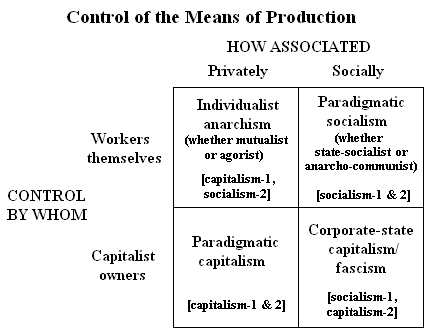
Pingback: Subsidized “Hussle” | Real Libertarian
Pingback: Minimum Wage, Minimum Cage | Real Libertarian
Pingback: EpiPen as a Shot in the Arm for Disarming Monopoly | Real Libertarian
Pingback: Reason Debates Jacobin on Capitalism, Socialism: Podcast – RE:ⒶL LIBERTARIAN
Pingback: Has The Government Betrayed “The Public Trust”? – Libertarianous
Pingback: Can We Do It Ourselves? – Libertarianous
Pingback: Hofstede’s Power Distance Index – Libertarianous